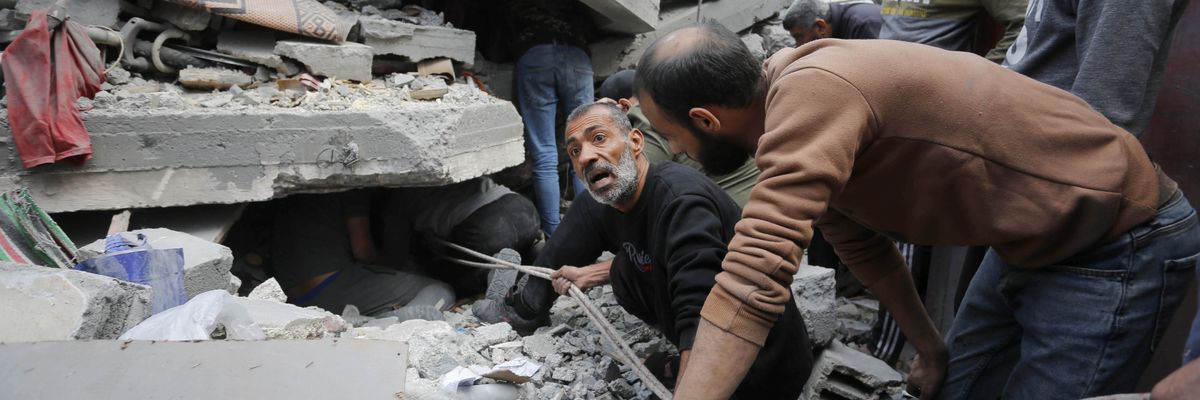Hours after Israeli forces rained 450 missiles on the people of Gaza, the United States vetoed a United Nations resolution calling for a cease-fire. There is no better example of the impunity enjoyed by the co-partners in this decades-long genocide. The Palestinian death toll for the past two months is fast approaching 20,000. The vast majority of those killed were so young that UNICEF currently deems this battered strip of land the most dangerous place on earth to be a child.
Hamas' October massacre of more than 1,100 Israelis was the match that lit the fuse for what has followed. And there's every reason to believe that the attack would have been more widespread had the perpetrators possessed Israel's overwhelming firepower. They do not. Israel receives billions of dollars from the U.S. annually for its military. Moreover, the political cover its government garners from its benefactor has been nothing short of priceless. How else to explain Israel's ability to sever an entire people from food, water, shelter, freedom of movement, bodily integrity, medical care, life-saving sanitation, and safe haven in full view of the world?
"Never Again" has come to mean "Never again will world leaders consider placing morality and human rights ahead of self-interest."
Israel couldn't have kept its foot on the throat of the Palestinian people for the past half-century without its partners in crime in Washington. And they now seem determined to finish the job. If UN Secretary General Antonio Guterres' summation that the people of Gaza are "looking into the Abyss" is even remotely accurate, Israel's end game appears to be within its reach.
Meanwhile, the slow-motion genocide in Darfur -- also compliments of U.S. complicity -- has once again kicked into high gear. For anyone who may have forgotten, the Khartoum government unleashed its fury on western Sudan twenty years ago in response to an uprising in the region. As many as 400,000 of its citizens died from either bombs, bullets, machetes, or starvation. Villages, as far as the eye could see, were reduced to rubble, burned to the ground, or both. More often than not, raids carried out by the government's proxy militia, the Janjaweed (a.k.a. "devils on horseback"), included the use of rape as a weapon. Millions were displaced. Hundreds of thousands fled to refugee camps in neighboring Chad. With few exceptions, those who made it -- and are still alive -- remain there.
Early on, then-U.S. President George W. Bush and his Secretary of State Colin Powell labeled the carnage "genocide," giving many around the globe hope that the U.S. would substantively intervene, per its obligation as a signatory of the UN Convention on the Prevention and Punishment of the Crime of Genocide. It was not to be. Instead, the Administration chose to prioritize the CIA's intelligence-sharing relationship with its Sudanese counterparts to augment the so-called "War on Terror." Save for a handful of journalists (myself included), it was a story mainstream media and high-profile activist organizations deemed too hot to handle.
Effectively left unchallenged, U.S. self-interest virtually ensured the region would descend into chaos. And it did. Dozens of power-hungry wanna-be warlords fought for control. A subsequent power-sharing arrangement between the two most prominent figureheads failed on every level. Today, the Janjaweed (now known, ironically, as the Rapid Support Force or RSF) has returned to haunt Darfur again. Only this time, they're far better equipped, toting machine guns, rocket-launchers, and driving motorized vehicles. Reports consistently document that males of all ages—including babies—are targeted for immediate execution. Women and young girls can only hope to avoid sexual assault. Nearly everyone who's managed to escape (after dodging a stream of deadly checkpoints en route) has fled to Chad, instantly doubling the population of the already under-served camps. Genocide Watch has called for the deployment of a UN Peacekeeping Force with a mandate to protect civilians.
None of this, of course, should come as a surprise. A partial list of Crimes Against Humanity associated with the U.S. include: the genocide of its indigenous peoples; Truman's vaporization of Hiroshima and Nagasaki during the Second World War; Nixon and Kissinger's blood-soaked "foreign policy" in Vietnam, Cambodia, South America, and beyond; Clinton's inaction during the Rwandan genocide; and the millions of deaths in Afghanistan, Iraq, Syria, Libya, Yemen, and Somalia attributed to the aforementioned Bush/Cheney "War on Terror."
It is almost impossible to reach beyond the numbness of it all and absorb so much sorrow. Next to me, as I write this piece, sits a small pouch containing a handful of pebbles—remnants of what was left of a village in Darfur. They were given to me by a colleague who was performing humanitarian work there during the early years of the genocide. But those tiny rocks could just as easily have come from the location of any of the tragedies I've mentioned.
As demonstrated by everything that happened before and since the coining of the phrase, "Never Again" has come to mean "Never again will world leaders consider placing morality and human rights ahead of self-interest."
For the longest time, we'd hoped it meant so much more.
Perhaps it never did.

